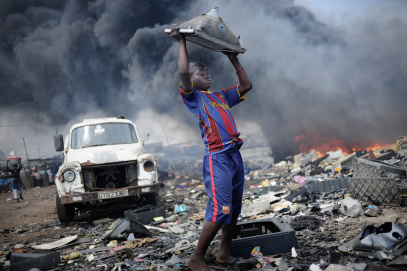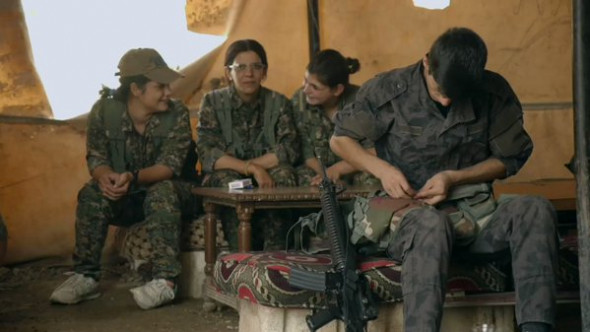Above Photo: From thefreeonline.wordpress.com
Late capitalism is like an express train screeching down a hill towards a cliff edge.. and the only way to stay on the rails, as is unanimously agreed, is BY ACCELERATING the ‘growth rate’..
So how will the revolution happen? The classic answer is that the workers will unite, strike, takeover, banish the insane 1% and put the world to rights.
Not likely to happen any time soon. For one thing we are divided and marginalised and being replaced by precarious labour and willing anti-union robots.
The Nation States each demand a monopoly of violence and coercion. They need to be abolished, ASAP, but they have 24.7 million bored troops, armed to the teeth and just longing for us to attack.
Capitalism needs to crash to the ground in smithereens, but most of us are dependent on its crumbs to survive and feed our kids.
And even if socialism or communism were to triumph we have generations of proof that top down State Control just Doesn’t Work.
So how will it happen? Or is it just wishful thinking?
First of all, we are not naturally greedy, selfish, cruel, self centered, bastards. Those are the qualities demanded of us by a perverse system.
Usually we are incredibly cooperative, practicing mutual aid and sharing with our friends, families and comrades at every opportunity in a million daily ways.
Though the alternatives to lunatic predator capitalism appear tiny and laughably weak that’s often because capitalism continually breaks them down.
They could suddenly go viral and become powerfully exponential. That is IF the financial system were to crash in pieces and if it were totally clear that the climate and biosphere could take no more insane, stupid, suicidal capitalism.
So what are these Revolutionary Embryos that could suddenly mushroom like crazy?
First the economy. Coops have always suffered, for one thing because you end up competing with capitalists and exploiting yourself.
But all over the world there are thousands of small and big coops, surviving and expressing our anti capitalist dreams, which could multiply and become immensely viable in the context of capitalist collapse. Take the Cooperativa Integral in Catalonia. . It’s a mixed consumer and producers coop and like many Iberian ventures has its own money, the Ecu. (which is interchangeable with the Euro and other alternative currencies, but not issued or directly controlled by the banks or the State). You can exchange, or gift or buy online, via Faircoop.
Take the Cooperativa Integral in Catalonia. . It’s a mixed consumer and producers coop and like many Iberian ventures has its own money, the Ecu. (which is interchangeable with the Euro and other alternative currencies, but not issued or directly controlled by the banks or the State). You can exchange, or gift or buy online, via Faircoop.
Tiny tiny, you may say, but this coop is also behind FAIRCOIN, which is a blockchain currency, like Bitcoin but collectively owned and managed without speculation to finance alternative projects and coops., In theory Faircoin could expand exponentially. It could develop into a world Coop currency and money-free credit system quite apart from State and Bank control.. (see #faircoop.. Occupying free economy with Anti-money.. #faircoin and many links below.)
 Okay coops… they could expand, but that will hardly self organise 8 billion of us.
Okay coops… they could expand, but that will hardly self organise 8 billion of us.
The hot organisational topic right now is ‘Democratic Confederalism’, a system elaborated by the heretical anarchist Murray Bookchin. The ideas were adopted by the Kurdish leader Abdullah Öcalan in his lifelong prison cell, and proposed, taken up and adapted by the revolutionary ‘Kurdish Spring’. The Kurds replaced the old hierarchical stalinist resistance of the PKK movement and renounced the goal of a new Kurdish state..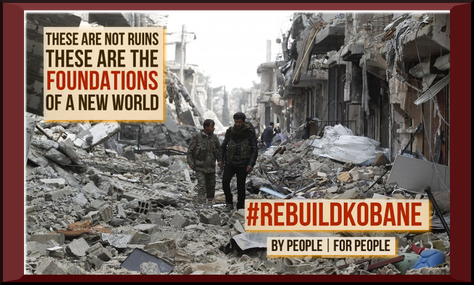
The Turkish dictator Erdogan rose to power on a fascist/nationalist/religious anti-Kurdish campaign based on military occupation, mass murder, imprisonment and repression. The result was a new generation of PKK fighters, and coincided with the takeover of Kurdish part of north Syria, Rojava.
 Rojava Revolution Plan: Organising and Funding Projects and Volunteers
Rojava Revolution Plan: Organising and Funding Projects and Volunteers
The Kurdish YPG and womens’ YPJ militias in Rojava trained and implemented the anarcho-municipalist ideas of Bookchin. They soon extended them to Arab, Assyrian, Christian, Azidi and International solidarity militias in the new umbrella Syrian Democratic Forces (SDF) alliance, now 100,000 strong. Captured cities were organised for the first time from the bottom up. And with quotas for the various ethnic minorities and women,(see Manbij)
The womens’ revolution has been especially strong, lifting women from truly feudal conditions to running their own army and directing attacks in ISIS HQ in Raqqa. The YPJ are much more than photo opportunities for the rabid western press, indeed both the Yazidis and impressed allied Arab militias have women’s sections and are embracing women’s liberation, unthinkable until very recently.
 The ‘Democratic Confederalism ‘ anti state system has thus been shown to work, despite the total blockade and military attacks, until recently from all sides. As such it represents right now an embryo for a new ‘Middle East Spring”, and could very well ‘go viral’ in a context of capitalist and oil price collapse. Especially if it were combined with an anarchist mutual aid type union on the lines of the CNT or the CGT in Iberia. .( see SYRIA: The life and work of anarchist Omar Aziz)
The ‘Democratic Confederalism ‘ anti state system has thus been shown to work, despite the total blockade and military attacks, until recently from all sides. As such it represents right now an embryo for a new ‘Middle East Spring”, and could very well ‘go viral’ in a context of capitalist and oil price collapse. Especially if it were combined with an anarchist mutual aid type union on the lines of the CNT or the CGT in Iberia. .( see SYRIA: The life and work of anarchist Omar Aziz)
Whether the Rojava Revolution can survive the ambitions and machinations of the US, Russia, Syria, Israel, Iran and all the various, voracious, vulture States remains to be seen.
Post-capitalism is already here, according to a film and play shown by the BBC [VIDEOS]
by TOM COBURG at The Canary Please share!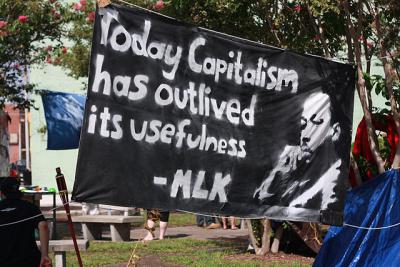
see also Accidental Anarchist..(watch full docu HERE) Ex diplomat on Why he Changed his Mind.…http://wp.me/pIJl9-a1T
[free PDF]PostCapitalism: A guide to our future by Paul Mason
There’s a post-capitalist fuse that connects people as far apart as Mexico and Syria. And the BBC recently aired a couple of broadcasts that suggest the future is already arriving.
BBC Four aired the insightful film Accidental Anarchist: Life Without Government, by former British diplomat Carne Ross, as part of its Storyville series.
Full Documentary 23 July 17.. 1 hour
The day before, meanwhile, BBC Two broadcast author and journalist Paul Mason‘s play ‘Why it’s Kicking off Everywhere’, which covers similar themes. Both the film and the play raise important questions about moving towards a post-capitalist world, particularly for those who live in ‘conventional’ societies but seek a more progressive future.
His play, though reformist, is actually updated to the present, with analysis of the Trump phenomenon and the latest neo-liberal tactic of Fake News and defending themselves by a campaign against the concept of ‘Truth’ itself.
https://player.vimeo.com/video/199834602
Below are some of the places and communities that feature in the two productions.
Rojava
Rojava is a multi-ethnic region in northern Syria, with a largely Kurdish population. After Syria became a war zone in 2011, communities in Rojava soon decided to defend and govern themselves. And the Democratic Society Movement (TEV-DEM) led this social revolution based on the ideology of democratic confederalism.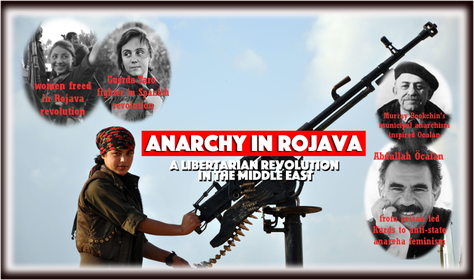
The Kurdish-led self-defence militias of the YPG and YPJ are – as a key part of the Syrian Democratic Forces (SDF) – among the most effective ground forces in the war against Daesh (Isis/Isil).
And as Carne Ross observes:
In terms of historical comparison, this project resembles most closely the short period of anarchism witnessed by George Orwell in Republican Spain during the Spanish civil war in the late 1930s.
Indeed, the YPJ (the all-female self-defence militia) is very much reminiscent of the Mujeres Libres (Free Women) in Spain during the 1936-39 civil war.
“The Most Feminist Revolution the World Has Ever Witnessed.” Full video: https://goo.gl/nUsf7d @VICE@carneross#YPG#Rojava
Greece
In 2015, Greece saw the left-wing Syriza win power on the ticket of rejecting Troika demands for more austerity. But the new government preferred to negotiate terms that satisfied no one. So it’s perhaps no wonder that a grassroots-organised parallel economy persists to this day.
Greece has always boasted an interventionist anarchist movement. One visible feature of this is the network of squatted refugee centres found across the country, but mostly in Athens.
One such centre is Hotel Plaza in central Athens. As well as a playground for refugee children, there are 126 rooms that include a dining room, a kitchen, a bar, a storage room for food, a healthcare centre, a roof garden, a classroom, and a library. The centre also runs its own blog. Others squatted centres include Orfanotrofeio and Hurriya in Thessaloniki. And there is EL CHEf, a food collective set up in 2008 at the height of the economic collapse and now providing food for both homeless people and refugees.

Another example of mutual aid in action is the ADYE health clinic. This operates from a squat and provides patient-centred healthcare free of charge to the communities that live in the Exarchia district of Athens. Since 2015, the majority of the patients treated there are refugees. One of the ADYE clinicians explains:
ADYE is a self-organized structure, all decisions are taken by a majority within the Assembly. We have a horizontal structure, we are all equal, there are no leaders or presidents
https://player.vimeo.com/video/224051475
Spain
2011 saw the rise of the Indignados and the 15-M (May 15) anti-austerity movement, which in time became a vast but decentralised movement. According to Occupy.com, around 8.5 million Spanish people participated in this movement. And in 2011 alone, more than 21,000 protests took place across Spain and helped to inspire the Occupy movement. 15-M evolved from the mass protests and strikes to set up of hundreds of local assemblies.
 But some of the 15-M activists went on to be elected in new initiatives, such as leaders of city councils. In contrast, striking miners distanced themselves from the Indignados and took up non-lethal arms like “homemade rocket-launchers, catapults and shields”.
But some of the 15-M activists went on to be elected in new initiatives, such as leaders of city councils. In contrast, striking miners distanced themselves from the Indignados and took up non-lethal arms like “homemade rocket-launchers, catapults and shields”.
Meanwhile, the squatting scene in cities across Spain, together with the anarcho-syndicalist union CNT-AIT, continue to act as a hub for political activism and community cooperation.
Mexico
Neither Ross’s film nor Mason’s play could cover every revolutionary movement in the world. But one that is definitely worth including is the Zapatistas of Mexico, whose example reportedly influenced (and links with) the revolution in Rojava.
Since 1994, the Zapatistas have openly fought for the right of Mexicans to govern themselves how they see fit, and not how political and economic elites see fit. They’ve also been slowly developing a system of direct democracy in a number of communities in southern Mexico. And they’ve done it independently, without the permission of national elites.
In the first months following their uprising in 1994, when they demanded “work, land, housing, food, health care, education, independence, freedom, democracy, justice and peace”, the Zapatistas reappropriated up to 1.7 million acres of land from large landowners.
And since 1994, they’ve made numerous achievements. They’ve created five zones, or Caracoles, that boast their own education, healthcare and justice systems; as well as cooperatives producing coffee, creating handicrafts and rearing cattle.
They have built two hospitals, 18 health clinics, and 800 community health houses. And they run 300 schools, with 1,000 teachers, and a centre for secondary education.
They may have a much lower profile than they previously had. But they very much exist. And in December 2012, they reminded people of their existence by marching in their thousands, peacefully and in silence, through nearby cities. They then went back to building and strengthening their alternative political system.
Post-capitalism and the wider scene
But what happens within ‘liberal democracies’ when post-capitalist solutions overtake conventional capitalism?
Paul Mason argues:
Our long-term aim should be to push more and more economic activity [to be] done outside the market and the state…[requiring in part the end of] reliance on wages for work.
But he adds that the state should continue to provide housing, healthcare, education, and transportation. So perhaps at some point, we will begin to see a society where people enjoy far more leisure and learning time, instead of being defined by wage slavery.
Mutual aid
Social revolution, like that practised by the Zapatistas or in Rojava, tends to happen when people are directly faced with authoritarian forces and life-or-death injustices. But in ‘liberal democracies’ like Britain, you can find thousands of examples of mutual aid every day. Just go to any village or any working class community.
And in the end, the ‘fuse’ that connects people is not an ideology, but simple human kindness and empathy.
Get Involved!
– Organise a showing of Accidental Anarchist in your local community centre.
– Books.. (no free PDFs found): The Leaderless Revolution by Carne Ross, PostCapitalism by Paul Mason, and more Canary articles on Rojava and the Zapatistas.

